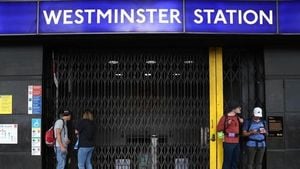Russia is currently grappling with severe economic turbulence, largely as a consequence of its invasion of Ukraine and the subsequent imposition of international sanctions. Events of late have indicated the possibility of widespread corporate bankruptcies threatening the stability of the country's economy. Recent reports highlight rising inflation, high interest rates, and growing financial strain on businesses as key factors contributing to this crisis.
On October 25, 2024, the Central Bank of Russia made the decision to raise its base interest rate to 21%, the highest since the onset of full-scale hostilities with Ukraine. Elvira Nabiullina, head of the Central Bank, acknowledged the necessity for more drastic measures to control the inflation rates spiraling due to mounting economic pressures. Critics from various sectors within Russia's corporate world have voiced growing discontent with the bank's continued maintenance of elevated interest rates, arguing these policies stifle business growth and investment.
The repercussions of these interest rate spikes have been evident, with corporate debt rising alongside the cost of borrowing. According to analysis, the number of corporate bankruptcies is anticipated to increase by 20% from 2023 to 2024, as the adverse effects of elevated debt costs become relentless. Economic analysts point to persistent inflationary pressures, where inflation remained stubbornly high at 8.54% as of October, with significant price hikes on staples. For example, the cost of potatoes—a basic food item for many Russians—has surged by 64% over the year, exacerbated by reduced domestic production.
British intelligence reports have suggested the Russian economy is inching toward stagflation—a bleak scenario combining stagnation and rising prices. According to the government-linked think tank TsMAKP, efforts to rein inflation through tight monetary policy may lead to dire economic stagnation. This predicament poses distinct challenges for the Central Bank, which typically employs rate cuts to stimulate growth during downturns. Yet, with inflation looming, the central bank faces the dilemma of maintaining high rates to combat rising prices at the risk of triggering recessionary conditions.
Sergei Chemezov, CEO of Rostec and close associate of President Vladimir Putin, has warned about the precarious situation many companies find themselves in due to soaring interest rates. Businesses have reported struggling to remain profitable; the steep rates are consuming funds and deterring investment. Chemezov stressed the dire consequences of continued high-interest rates, stating: "If we continue to work like this, then most of our enterprises will go bankrupt."
Historically, interest rates were more manageable, resting at 7% around April 2022. The substantial jump to present levels reflected an abrupt shift to aggressive economic strategies as the war escalated and international sanctions took hold. Such decisions have triggered widespread concerns and have rippled through Russia’s corporate sector. Firms are becoming increasingly wary as the economic climate evolves amid heightened risks of bankruptcy.
Looking forward, the Russian economy faces multiple hurdles. Analysts forecast continued challenges, such as dwindling governmental resources as public spending is set to rise, labor shortages, and the formidable pressure from sanctions. These factors together create complex dynamics for policymakers who seek to stabilize the economy without exacerbation to inflation or inciting business failures.
Recent data indicates the Russian economy shrank by 3.1% year-over-year as war-related disruptions continue to hinder productivity. Moving beyond projections, experts believe the Central Bank may soon raise interest rates yet again—predictions hovering around the possibility of reaching 22%—if inflation does not start to retreat.
Overall, the picture painted of Russia's economic future is bleak, with mounting challenges leading businesses and citizens to brace for tough times ahead. Uncertainty surrounds the Kremlin and its economic strategists as they navigate the choppy waters of recession possibility, rising prices, and potential corporate failures exploding upon the national stage. The message is clear: Russia must heed the warnings about impending economic disaster resulting from its protracted conflict and unyielding monetary policy decisions.



